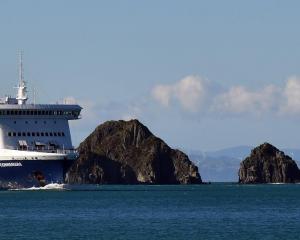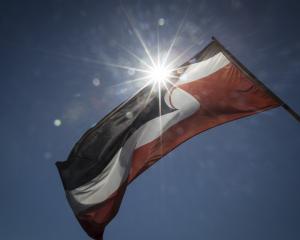Anzac Day ceremonies are gathering popularity with young families throughout New Zealand. Hawea was no exception, Liz Breslin writes.
April 25, 6.30am, and the cars are already backed up a 10-minute walk away from the Hawea peninsula.
In the dark, families walk, carrying the very young, pushing the rather older, to congregate around a slab of stone and a flagpole.
This year marks 100 years since the first Anzac ceremony on New Zealand shores; last year it was the commemoration of a century after the actual Anzac landings.
Two years ago, the start of World War 1, in two years' time, its end.
So no wonder every intermediate pupil has an Anzac poem or two under their belt and all the primary school kids in the district can sing "One more parade/one more digger by his side/lest we forget'' along with the canned music.
The service starts with bagpipes at 7am, and as a blue hue un-greys the lake, it is an intermediate student who leads us, beautifully, in the singing of the national anthem; 30 or so teeny primaries sing a soldiering song.
And of course, the parents are watching.
And of course, we are proud of their participation.
But this in itself is not enough to explain.
Not enough to explain the participation or the pride.
Almost every decade is represented in the can't-see-from-the-back crowd.
Kiwis, mostly, though the Aussie anthem also represents.
A 20-something cool-as guy with a strip of family medals.
People new to the district.
People whose family names are read out on the roll of honour.
Maybe we are a microcosm of what's going on around the country.
It's been reported every year, year on year, since the 1990s, that Anzac attendance is going up.
It's doing better than the economy.
And how?
Why have we kept this day, above all other public holidays, free of commercialism?
By law, shops cannot open until 1pm.
Tell that to the Easter bunny.
Some of the assembled are the same people who protested the sending of New Zealand troops to Iraq not so long ago.
A few may have been protesters against previous wars.
A lot of us shake our heads at the amount of war on this and that in the media.
And, thankfully, most of us have no idea what it is like to be involved in the minute-to-agonising-minute minutiae of active soldiering.
The names of the fallen are read out by a year 13 pupil.
Some of them were only three or four years his senior when they "fell''.
And who can imagine that?
Falling sounds passive, almost, leaves do it in a breeze.
But remembering, in itself, is an active thing.
And that is what we are all there to do.
We hear the names.
We remember them.
The cannons blast, echoing into the silence across the lake.
The gusty singing makes us glad to belong.
This is a new world, this is a brave one, in which none of our sons and daughters will be sent to fight another man's cause.
But they might choose to fight our own.
Is it cyclical?
This is what they fought for, so we can be free.
So we must remember and relive.
A decisive factor in the local school debates about what got called "the versing of flags'' was the "what would happen on Anzac day?' scenario.
The current flag won out loud and clear and those too young to vote for real didn't seem to have a problem reconciling history with their own experience.
Defeat with pride.
In the plural worlds they inhabit, they can appreciate that commemoration doesn't necessarily mean glorification; their own Anzac writing delves further than cliches about cobbers on cold beaches.
As the service finishes, there is a double biplane flyover.
The timing is perfect.
A good show.
A great effort.
One of the best.
We race for the warmth of our cars and the coffee machine at home.
- Liz Breslin is a Lake Hawea writer.










